Can you imagine all the knowledge of your business centralized in one program? That’s the meaning of a knowledge base. A knowledge base software is a tool that allows you to collect, organize, manage, and share essential business information in a structured and efficient way.
You can use a Knowledge Base Software to collect, organize, manage, and share your business information in a structured way, including critical documents like SOPs. Additionally, it simplifies the process of writing an SOP and makes it easier for both internal and external users to access this information efficiently and consistently.
Choosing the right best knowledge base software can make all the difference. This guide breaks down what to look for, helping you select the best solution to keep your team organized, informed, and working together seamlessly.
Types of Knowledge Base Software
Knowledge base software comes in various types to suit different business needs, ranging from simple FAQ systems designed to provide quick answers to common questions, to more advanced platforms that integrate with customer support tools, offer collaboration features for teams, and include analytics to track usage and improve content.
Each type caters to specific use cases, such as enhancing customer self-service, streamlining internal knowledge sharing, or maintaining detailed technical documentation.
- Internal Knowledge Base Software: Used by employees within an organization to share company information, internal processes, and resources, helping streamline collaboration and productivity.
- External Knowledge Base Software: A public-facing platform that allows customers to access self-service support, FAQs, and troubleshooting guides, enhancing customer experience and reducing support ticket volume.
- Cloud-Based Knowledge Base: Hosted on the cloud, offering easy access, scalability, and remote collaboration across teams, without the need for infrastructure maintenance.
- On-Premise Knowledge Base: Installed locally on company servers, providing more control over data security and compliance, ideal for organizations with specific privacy requirements.
- Hybrid Knowledge Base: Combines both internal and external features, allowing businesses to manage both employee resources and customer-facing content in one unified system.
Each type offers unique benefits, supporting businesses in improving efficiency, accessibility, collaboration and helps to go paperless.
11 Best Knowledge Base Software Choices in 2025
A strong knowledge base is crucial for boosting team productivity and delivering great customer support. Whether you need an internal resource hub or a customer-facing help center, the right knowledge base software can make a big difference. These tools help centralize information, streamline communication, and improve efficiency across teams.
Here are the top 10 knowledge base software solutions that can transform your knowledge management strategy.
1. Whale: Centralizing Your Team’s Knowledge with Ease
Whale is a robust knowledge base software designed to enhance internal communication, streamline workflows, and simplify knowledge sharing within teams. It offers an intuitive platform that allows businesses to efficiently manage and distribute critical information.
- All-in-One Knowledge Repository: Easily consolidate your organization’s knowledge in one centralized space, making it simple for teams to access and share information.
- Customizable Platform: Tailor Whale’s interface and features to fit the unique needs of your business, ensuring it aligns with your existing workflows and requirements.
- Collaboration Made Easy: Enable real-time updates and seamless sharing of resources, allowing teams to collaborate effortlessly across departments.
- Integration Ready: Whale integrates smoothly with popular tools like Slack, Google Workspace, and other business solutions, improving efficiency and keeping your workflow intact.
- Simplicity and Ease of Use: With its user-friendly interface, Whale requires no technical expertise to get started, allowing employees to begin using it immediately.
Whale is perfect for companies seeking to improve internal knowledge management (as a training software) and boost team productivity.
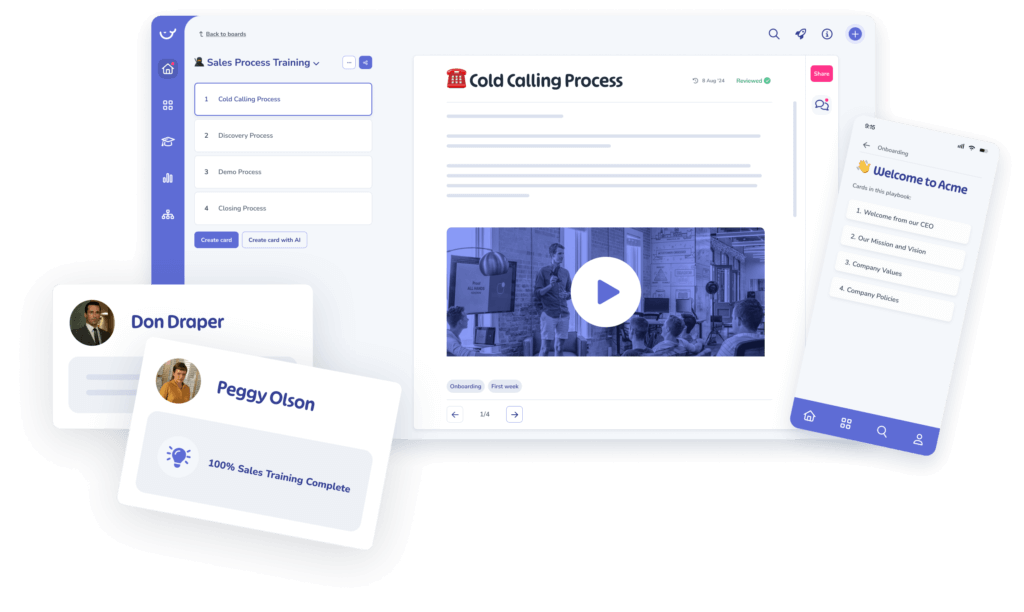
2. Helpjuice: Simplifying Knowledge Management for Your Team
Helpjuice is a versatile knowledge base tool designed to help businesses organize, manage, and share internal information efficiently. It allows teams to create a centralized repository of knowledge, enabling faster collaboration and decision-making. Helpjuice’s intuitive interface and robust search capabilities make it easy for employees to find answers quickly, boosting productivity and customer satisfaction.
Key Features of Helpjuice:
- All-in-One Knowledge Repository: Consolidate your company’s documents, guides, and FAQs into one easily searchable platform, improving accessibility and reducing time spent searching for information.
- Customization Options: Tailor the knowledge base’s appearance and structure to match your brand’s identity and specific business needs, with flexible design options and customizable workflows.
- Advanced Search Functionality: Helpjuice’s powerful search engine makes it easy for users to find relevant content quickly, enhancing efficiency and reducing downtime.
- Collaboration Tools: Foster teamwork by allowing real-time commenting and updates, making it easy to work together and refine content.
- Analytics and Insights: Access detailed analytics on content performance, user engagement, and search activity to optimize your knowledge base and identify areas for improvement.
Helpjuice is ideal for businesses looking to improve internal knowledge sharing, enhance customer self-service, and optimize team collaboration. Its ease of use, customization, and advanced search capabilities make it a great choice for any organization.
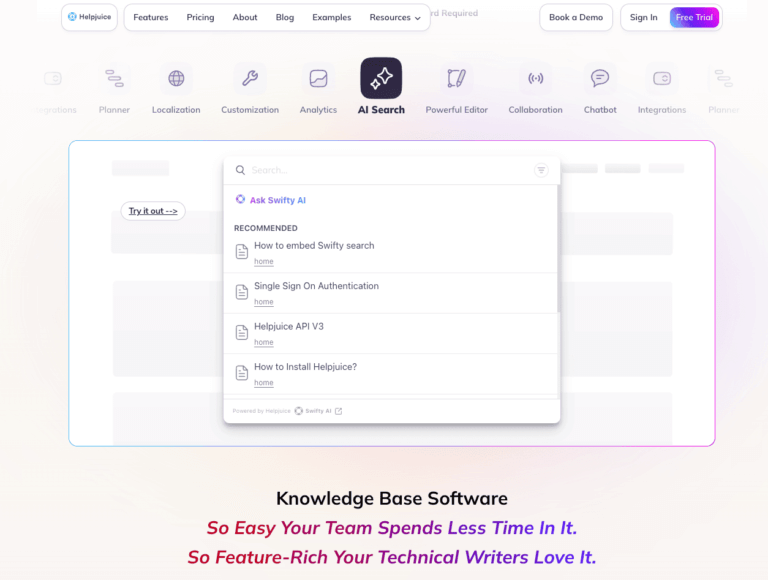
3. Heroic Knowledge Base: A feature-rich knowledge base solution
Heroic Knowledge Base is a feature rich plugin to create any kind of knowledge base system with WordPress.
It is a proven solution (improved over the last 14 years) that is trusted by over 30,000 users, and by brands like Pagely and Sennheiser.
It offers top of the line features that you would expect from any SaaS based knowledge base solution.
Key Features of Heroic Knowledge Base:
- Easy setup wizard: Get started as quickly as in 10 minutes. Install the demo template — customize, and you are ready to start uploading your support content.
- Customization options: Flexible design options, from layout management to changing colors or font to your liking.
- Advanced search bar: A really helpful and dominant Ajax powered search bar to make finding relevant guides a breeze.
- AI Assistance: AI is not here just for the namesake. It is actually useful, creating a real-time chatbot-like experience with answers that are not vague (AI trained on internal resources).
- Analytics and insights: You get the built in analytics and reporting capabilities. Insights that are useful to improve your knowledge base.
You can’t go wrong with the Heroic Knowledge Base. A solution that offers powerful features, easy to use, and is very cost effective at the same time.
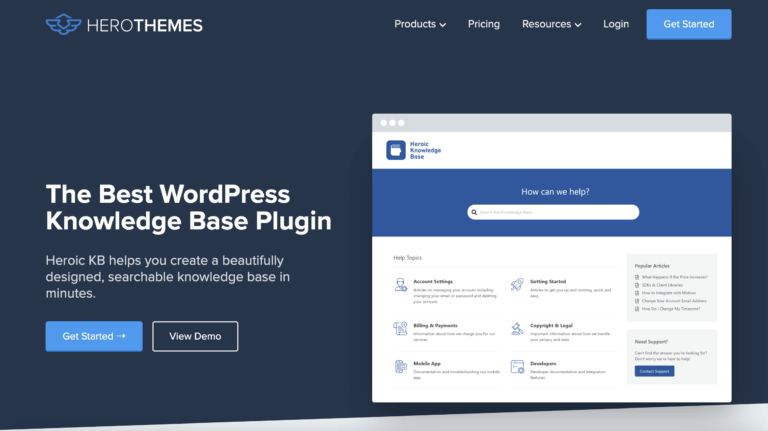
4. Zendesk: A Comprehensive Knowledge Base Solution for Businesses
Zendesk is a powerful and user-friendly knowledge base software designed to streamline customer support and internal communication. It offers a robust platform for creating, managing, and sharing knowledge across various teams and customers. Zendesk’s knowledge base helps businesses reduce response times, improve self-service options, and centralize important information, making it easily accessible to employees and customers alike.
Key Features of Zendesk:
- Centralized Knowledge Repository: Create and store a comprehensive database of articles, FAQs, and help resources in one place, simplifying content management and accessibility.
- Customizable Content: Tailor your knowledge base’s design, content layout, and branding to suit your business needs and customer experience goals.
- Multilingual Support: Zendesk allows you to create knowledge base content in multiple languages, making it ideal for businesses with international customers.
- Powerful Search Functionality: Customers and internal users can easily search for relevant information with Zendesk’s robust search features, ensuring faster resolutions.
- Seamless Integration: Zendesk integrates with a wide range of third-party tools and platforms like Salesforce, Google Workspace, and Slack, enhancing your team’s workflow.
- Analytics and Reporting: Access detailed insights into how knowledge base articles are performing, helping you optimize content and measure customer satisfaction.
Zendesk is an excellent choice for businesses looking to improve their customer support and internal knowledge base software management. With its easy-to-use interface, customization options, and powerful search capabilities, Zendesk makes it simple for teams to share and access vital information efficiently.
5. Guru: A Knowledge Base for Seamless Team Collaboration
Guru is a knowledge base software designed to centralize information and foster team collaboration. With real-time updates and powerful search features, it ensures your team can access and share critical knowledge effortlessly.
Key Features of Guru:
- Centralized Knowledge Hub: Store all your team’s resources in one accessible place.
- Real-time Collaboration: Update and share knowledge instantly with team members.
- AI-Powered Search: Quickly find the information you need with smart search functionality.
- Tool Integrations: Connect Guru with Slack, Google Workspace, and more for smoother workflows.
- Verified Content: Ensure content accuracy with approval and verification features.
Guru is perfect for teams seeking a collaborative, easy-to-use platform for efficient knowledge sharing.
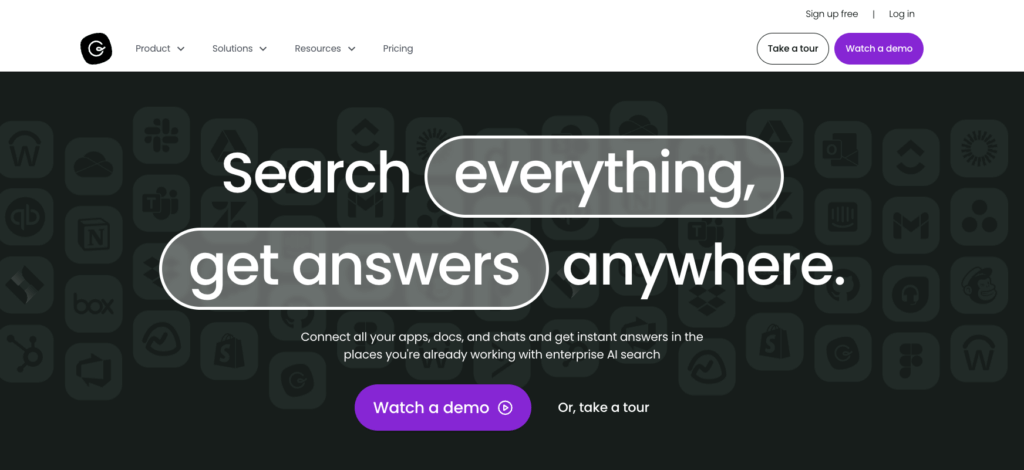
6. Document360: A Powerful Knowledge Base Solution
Document360 is a knowledge base software that offers businesses a streamlined platform for creating, managing, and sharing documentation. It helps teams centralize and organize their knowledge, ensuring easy access and collaboration for both internal and external users.
Key Features of Document360:
- Centralized Knowledge Base: Store and organize your company’s documentation in one place for easy access.
- User-friendly Interface: With its intuitive design, Document360 makes it easy to create and update content without technical expertise.
- Markdown Support: Use Markdown to create rich, structured content that’s easy to format and manage.
- Advanced Search: Quickly find information with powerful search capabilities, ensuring that users get the answers they need fast.
- Version Control: Track and manage changes in documents, keeping content up-to-date and accurate.
Document360 is an ideal solution for businesses looking to centralize knowledge, improve internal collaboration, and provide better self-service for customers.

7. Bettermode: A Community-Driven Knowledge Base Platform
Bettermode is a knowledge base software designed to support community-driven content and enhance collaboration. It allows businesses to create a comprehensive knowledge hub that engages both internal teams and external users, making it easier to share resources and information in a collaborative environment.
Key Features of Bettermode:
- Community-Driven Knowledge Sharing: Enable external users and customers to contribute to your knowledge base, fostering community engagement and collaboration.
- Multilingual Support: Reach a global audience with multilingual capabilities, allowing you to provide localized content for different regions.
- Federated Search: Search across all integrated tools and platforms to find relevant information quickly, making knowledge sharing more efficient.
- Customizable Design: Tailor the look and feel of your knowledge base to align with your brand and business needs.
- Advanced Analytics: Gain insights into how your content is performing and where improvements can be made to enhance user experience.
Bettermode is ideal for businesses that want to create a collaborative, user-driven knowledge base while providing self-service support for both customers and internal teams
8. HubSpot Service Hub: Simplifying Customer Support with Knowledge Management
HubSpot Service Hub is an all-in-one customer support platform that includes a powerful knowledge base software feature to streamline your business’s customer service. It helps you centralize support content, improve self-service options, and automate workflows, all while seamlessly integrating with HubSpot’s CRM tools.
Key Features of HubSpot Service Hub:
- Centralized Knowledge Base: Easily create and manage help articles for customers.
- Ticketing System: Efficiently track and manage customer queries.
- Multilingual Content: Serve a global audience with localized knowledge base articles.
- Custom Branding: Personalize the look and feel of your knowledge base.
- Automation: Automate tasks like ticket routing and receive performance insights.
HubSpot Service Hub is perfect for businesses looking to enhance customer service and improve team efficiency with a seamless, easy-to-use platform.

9. Bloomfire: Empowering Teams with Knowledge Sharing and Collaboration
Bloomfire is a dynamic knowledge base software designed to enhance team collaboration and knowledge sharing. It centralizes information, making it easy for employees to find the resources they need, engage with content, and share expertise across the organization.
Key Features of Bloomfire:
- Centralized Knowledge Hub: Store and organize your team’s knowledge in one accessible platform.
- AI-Powered Search: Quickly find relevant content with Bloomfire’s intelligent search functionality.
- Collaboration Tools: Enable teams to comment, share, and discuss content in real-time.
- Multimedia Support: Upload various content types like videos, images, and documents to enrich your knowledge base.
- Analytics: Track content performance and usage to identify knowledge gaps and optimize your resources.
Bloomfire is ideal for businesses looking to boost collaboration, improve knowledge management, and make information easily accessible for employees.
10. Nuclino: A Collaborative Knowledge Base for Teams
Nuclino is an intuitive knowledge base software designed to enhance team collaboration and streamline information sharing. It allows businesses to organize knowledge in a simple, visual way, making it easy for teams to contribute, collaborate, and access key information quickly.
Key Features of Nuclino:
- Collaborative Knowledge Base: Create, share, and organize content collaboratively in real time.
- Simple Interface: A clean, visual interface that makes knowledge management intuitive and easy to use.
- Instant Search: Quickly find relevant documents and content using a powerful search engine.
- Integration with Tools: Connect with platforms like Google Drive, Slack, and Trello for seamless collaboration.
- Team Collaboration: Allow team members to comment, edit, and update content in real-time, improving workflow and communication.
Nuclino is ideal for teams seeking an easy-to-use, collaborative knowledge base solution to centralize their information and improve overall productivity.
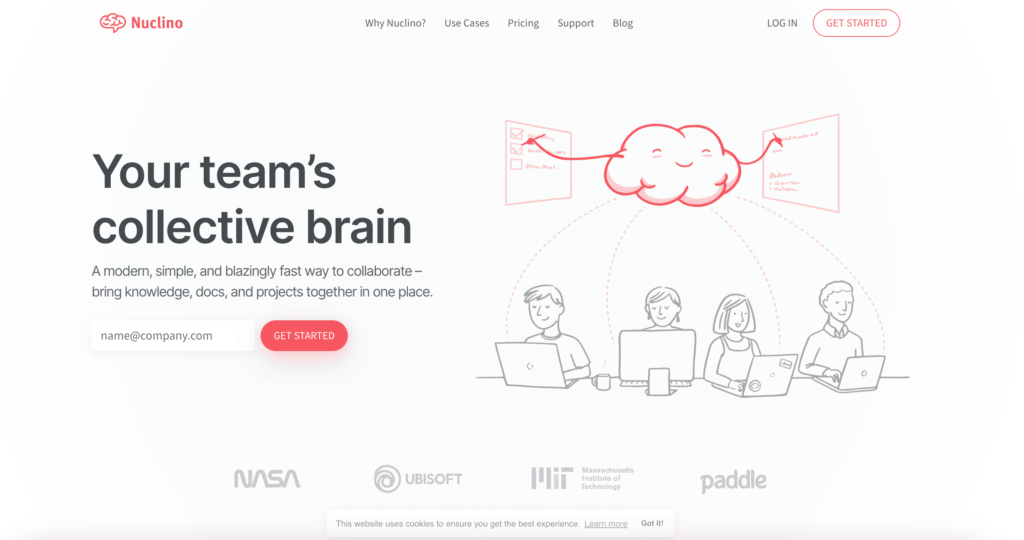
11. Zoho Desk: A Smart Knowledge Base for Support Teams
Zoho Desk is a customer support software with an intuitive knowledge base feature that streamlines support operations and enhances self-service for customers.
Key Features of Zoho Desk:
- Centralized Knowledge Base: Easily manage help articles and FAQs in one location.
- Multi-Channel Access: Customers can access knowledge via email, chat, or social media.
- AI-Powered Search: Quickly find relevant content with smart search.
- Customizable: Personalize your knowledge base to match your brand.
- Analytics: Track content performance and optimize for better customer service.
Zoho Desk helps businesses improve support efficiency and customer satisfaction with an organized, easy-to-use knowledge base.
Why Do You Need an Internal Knowledge Base Software?
An internal knowledge base is a powerful tool that helps organizations centralize and manage their information. This makes it easier for teams to collaborate, access important resources, and improve operational efficiency.
In short, an internal knowledge base software is a key tool for improving efficiency, collaboration, and scalability within an organization. It streamlines knowledge management, reduces costs, and helps create a more informed and empowered workforce.
By using knowledge base software, businesses can systemize their business processes, making operations more structured and consistent. Whether you’re a small business or a large enterprise, the benefits of internal knowledge base software can help drive business success.
Benefits of Using a Knowledge Base Tool
Using a knowledge base tool offers numerous benefits for businesses, especially when it comes to managing and sharing information efficiently. Here are some key advantages:
- Save on Costs: With features like chatbots powered by your knowledge management system, you can answer basic customer queries without increasing your team size, reducing the need for extra staff and minimizing costs.
- Improve Team Collaboration: When your team has instant access to the right information through a knowledge base tool, they can collaborate more efficiently. This leads to faster problem-solving and better communication across your business.
- Simplify Employee Training: Knowledge base software articles are always available at the click of a button. This makes training new team members a breeze, allowing them to learn from existing materials and get up to speed quickly.
- Free Up Time: By empowering your customers to solve issues themselves with a knowledge base tool, your team can focus on providing even better customer support, addressing more complex needs, and delivering top-tier service.
- Streamline Efficiency: Centralizing all your company’s information in knowledge management software makes it easier for both internal teams and customers to find what they need quickly, improving overall efficiency.
- Scale With Ease: As your business grows, a Knowledge Management System ensures consistency in the information you share and helps implement quality control during business growth, allowing your team to scale without losing valuable knowledge or customer insights.
- Empower Self-Service: Customers can access your knowledge base software to resolve issues on their own, reducing the strain on your support team and enhancing the overall customer experience.
- Boost Team Collaboration: When all your content is in one place through a Centralized Knowledge Platform, teams can easily collaborate, update documents, and stay on the same page. This keeps everyone aligned and informed.
- Increase Productivity: With easy access to the right information in your knowledge base tool, employees spend less time searching for answers and more time tackling important tasks, leading to a more productive team overall.
In summary, knowledge base software is for improving internal workflows, reducing support costs, and providing a better customer experience.
Ways to Integrate a Knowledge Base Platform
Here are 5 common ways to integrate a knowledge base platform:
- CRM Integration: Linking your knowledge base with CRM tools like Salesforce or HubSpot helps streamline customer interactions by providing quick access to relevant customer data and knowledge articles.
- Help Desk Software Integration: Integrating with help desk platforms like Zendesk or Freshdesk allows support agents to access knowledge base articles directly within their ticketing systems, speeding up response times.
- Chatbot Integration: Adding a knowledge base to your chatbot (e.g., with tools like Intercom) enables automated customer support, guiding users to relevant articles or answers instantly.
- Internal Communication Tools: Integrating with platforms like Slack or Microsoft Teams helps teams easily share knowledge base articles during conversations, improving collaboration and quick access to information.
- API Integrations: Many knowledge base platforms provide APIs to connect with other internal systems (such as databases or project management tools), allowing seamless sharing and retrieval of knowledge across various business tools.
These integrations ensure that your knowledge base becomes a central hub of accessible information for both employees and customers, enhancing productivity and support efficiency, while allowing Subject Matter Experts (SMEs) to contribute their expertise directly to the platform.
Get documenting & training NOW
FAQs for Knowledge Base Software
Can knowledge base software be used for internal knowledge management?
Yes, many knowledge base platforms are designed for both internal and external use, allowing businesses to centralize documents, processes, and team knowledge to streamline operations and improve collaboration.
Is knowledge base software scalable for growing businesses?
Yes, a good knowledge base platform is scalable, allowing businesses to add more content, users, and features as they grow, without compromising on speed or performance.


